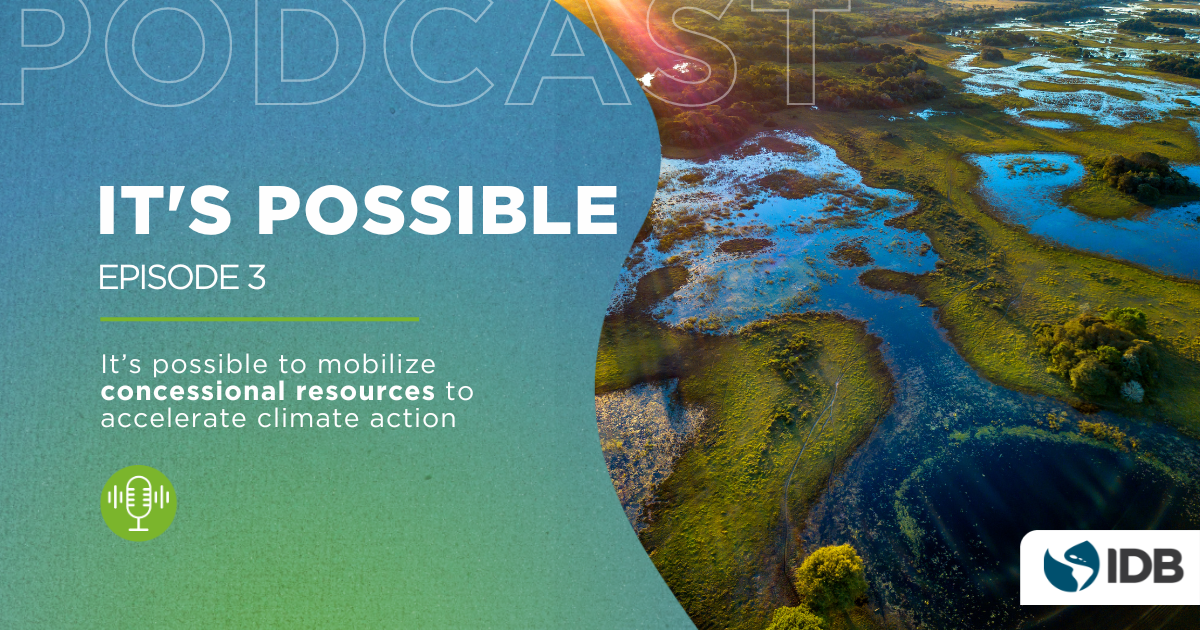The next decade is critical to see whether countries can move fast enough to implement plans to adapt to this increasingly complex challenge: the climate and biodiversity crisis.
The LAC region benefits from accessing donor resources to address climate change’s challenges in their economies, finding ways to increase ambition, and searching for solutions to tackle climate change. Through concessional climate finance, Multilateral Development Banks like the IDB provide financing to developing countries through grants and concessional lending.
In the third episode of IT’S POSSIBLE, we discussed the topic of concessional climate finance and featured the NDC Pipeline Accelerator Multi-Donor Trust Fund (ACL).
Hosted by Isabelle Braly-Cartillier, Operations Lead Specialist, IDB, the episode focused on how concessional climate finance is accelerating climate-resilient and sustainable investments with three expert guests: Gloria Visconti, Sector Lead Specialist, IDB, Leena Klossner, Deputy Managing Director, NDF, and Marcelino Madrigal, Energy Division Chief, IDB.
What is Concessional Climate Finance?
Concessional climate finance is the pool of financial resources with a cost below market rates. It can be provided, among others, through reimbursable resources like loans or, non-reimbursable resources like grants, or a mix of both. Some examples of these resources that can cover the incremental cost of innovative investments that address climate change for climate mitigation and adaptation are provided by the Green Climate Fund, the Climate Investment Funds, and the NDC Pipeline Accelerator Multi-Donor Trust Fund (ACL).
Most of these financial resources come from national budgets, but the IDB, as well as other multilateral development banks, are supporting Latin American countries to cover those costs through IDB ordinary capital blended with concessional climate finance.
Concessional climate finance is a central tool to mobilize resources towards the energy transformation in the region. Here are three learnings in the implementation of Concessional Climate Finance presented by our expert guests in the episode:
1. Adaptability and scalability: we need to adapt continuously to address the upcoming demands and needs of a rapidly changing environment. This includes how finance is tailored to needs and how access is granted to these funds. If we want timely, innovative and real solutions, we have to shift and make finance more agile to respond to the challenge. Mobilizing concessional financing is critical to support LAC countries in their mission to fulfill their international commitments and bring transformational change. The scaling-up of climate finance mechanisms could be an efficient way to increase the private sector’s interest in mobilizing climate finance and thus make progress to accelerate climate action.
2. Measurement: impact measurement is instrumental in the mobilization and distribution of resources. By analyzing the impact, we can create data that will feed into the learning loop to create better projects and results. There is a need to implement measurement frameworks for climate investments that include financial data, social data, and SDG markers to build solid cases because only what gets measured gets financed.
3. Continuity: as seen in the case of the NDC Pipeline Accelerator Multi-Donor Trust Fund (ACL), there are excellent financing facilities, financing mechanisms, and existing products that are creating a difference in climate finance. Given the speed and scale of the challenges, mobilizing climate financing resources should, as much as possible, use existing channels to funnel these resources and avoid duplicating efforts. However, it is also crucial to take note of the existing mechanisms and give continuity to the projects working in the different countries. It’s about more than reinventing the wheel; it’s returning to the basics and designing and implementing correctly.
The IDB champions policy dialogue, modeling investments, and pioneering innovative financial mechanisms to transition to low-carbon and climate-resilient economies. These collaborations multiply resources and empower the IDB to leverage partnerships, driving progress toward global climate and biodiversity commitments. Click here to listen to the It’s Possible concessional climate finance episode on your favorite platform.
Here’s more It’s possible podcast episodes:


Leave a Reply